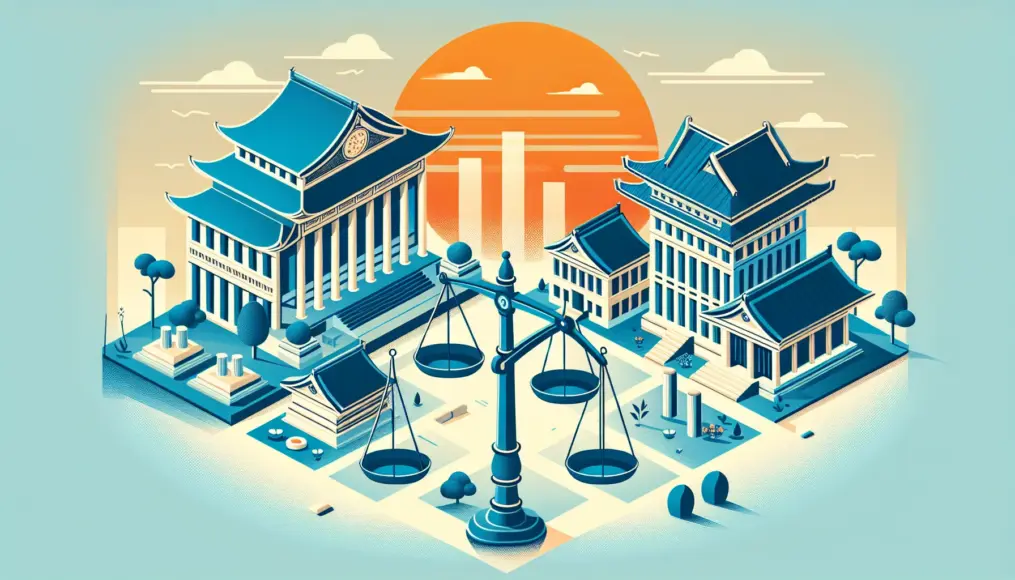The separation of powers is a crucial concept in politics. By ensuring that the three branches of government—legislative, executive, and judicial—operate independently, this framework prevents the concentration of power and protects citizens’ rights. But how does this system impact our lives and society as a whole?
In this article, we’ll take a closer look at the fundamental mechanisms of the separation of powers, its historical background, and its significance in modern society. We’ll also explore the role of this system as we look towards the future, so stay tuned!
- The fundamental mechanisms and roles of the separation of powers
- The history and evolution of the separation of powers in Japan
- The impact of the separation of powers in modern society and future outlook
What is the Separation of Powers? Understanding the Basics
The separation of powers is a crucial mechanism in politics that divides authority among different branches of government. This system ensures that the legislative, executive, and judicial powers operate independently and keep each other in check, aiming to prevent any abuse of power. The concept of separation of powers is one of the cornerstones of democracy and is essential for safeguarding citizens’ rights.
In this section, we will explore the fundamental principles of separation of powers and the roles of the different branches involved. We will also consider its historical connection to the French Revolution, which played a significant role in shaping this concept.
Roles of the Legislative, Executive, and Judicial Branches
Within the framework of separation of powers, each branch—legislative, executive, and judicial—has its own distinct responsibilities. The legislative branch is responsible for creating laws, the executive branch implements those laws, and the judicial branch interprets and applies them. By maintaining this independence among the branches, the concentration of power is mitigated, leading to a fairer society.
The legislative branch typically consists of a parliament or congress, where representatives of the people gather to formulate laws. The executive branch is managed by the government or cabinet, which carries out policies based on these laws. Meanwhile, the judicial branch, represented by the courts, resolves disputes based on legal interpretations.
- The basic role of separation of powers is the distribution and checking of authority.
- The legislative branch creates laws, while the executive branch enforces them.
- The judicial branch interprets and applies the law.
The French Revolution and the Origins of Separation of Powers
The idea of separation of powers gained traction during the French Revolution. This movement aimed to break free from absolute monarchy and advocated for the decentralization of power. The revolutionary motto of “liberty, equality, fraternity” guided the search for a new political system.
During the French Revolution, the dangers of concentrated power were highlighted, emphasizing the necessity of a system of checks and balances. This idea was later incorporated into the constitutions of many countries, becoming a fundamental principle of democracy.
- The French Revolution is a significant origin of the concept of separation of powers.
- There was a demand to escape from the concentration of power.
- Separation of powers has influenced the constitutions of many nations.
Historical Background and the Development of Separation of Powers
The concept of separation of powers has historically played a significant role in many countries around the world. In Japan, this framework was introduced during the Meiji era when Western political thought began to influence the nation, leading to the incorporation of separation of powers into the constitution. This system has served as a foundation for preventing the concentration of power and safeguarding the rights of citizens.
In this section, we will explore the introduction of the separation of powers in Japan, as well as its evolution after World War II. By understanding the historical context, we will gain insights into the importance of this principle in the current Japanese political system.
Introduction of Separation of Powers in Japan
In Japan, the concept of separation of powers was introduced during the Meiji era under the influence of Western ideas. The Constitution of the Empire of Japan, enacted in 1889, explicitly outlined the independent functioning of the legislative, executive, and judicial branches. Although this constitution strengthened the authority of the emperor, it also established a parliament as a legislative body, thus formally creating a system of separation of powers.
However, in reality, the emperor’s power was quite strong, and the ideals of separation of powers were not fully realized. Nevertheless, this constitutional framework had a significant impact on Japan’s political structure in the years that followed.
- Introduction of separation of powers during the Meiji era
- Formal separation of powers based on the Constitution of the Empire of Japan
- Challenges in realizing the ideals due to the strong authority of the emperor
Evolution of Separation of Powers in Post-War Japan
After World War II, Japan adopted a new constitution that clearly established a separation of powers based on democratic principles. The Constitution of Japan, which came into effect in 1947, demanded a clearer division of legislative, executive, and judicial powers, requiring each to function independently. This constitution provides a framework that respects the basic human rights of citizens and prevents the arbitrary exercise of power.
In post-war Japan, efforts continue to realize the principles of separation of powers, particularly through the strengthening of judicial independence, which has enhanced political transparency. As a result, citizens’ rights are protected, and a crucial framework has been established to prevent the abuse of power.
- Establishment of separation of powers with the enactment of the new constitution in 1947
- The Constitution of Japan respects the basic human rights of citizens
- Strengthened judicial independence has improved political transparency
The Impact of the Separation of Powers in Modern Society
In today’s world, the structure of the separation of powers plays a crucial role in ensuring political stability and protecting citizens’ rights. By appropriately distributing power, no single branch can dominate the others, fostering a system of mutual oversight. This framework enhances the overall trust in society and serves as a vital component of democracy.
In this section, we will explore how the separation of powers influences modern society, particularly in terms of contributing to political stability and safeguarding citizens’ rights.
Contribution to Political Stability
The separation of powers is an essential system for maintaining political stability. By keeping the legislative, executive, and judicial branches independent from one another, it prevents the excessive concentration of government power. This distribution of authority not only improves transparency in policy-making but also helps build the public’s trust in the government.
Moreover, having an independent judiciary provides an important check on those in power. By ensuring that fair judgments are made based on the law, it safeguards citizens’ ability to seek redress against unjust power abuses. This mechanism helps avoid political turmoil and contributes to a stable society.
- The separation of powers contributes to political stability
- Increased transparency through power distribution
- Strengthened checks against misconduct
Protection of Citizens’ Rights
The separation of powers also plays a significant role in protecting citizens’ rights. When legislative authority is exercised by representatives of the people, it becomes easier to reflect citizens’ opinions and needs in the law. This ensures that there are mechanisms in place for citizens to defend their rights, fostering a democratic society.
Furthermore, the guarantee of judicial independence protects the right to a fair trial based on the law. This reinforces the system designed to shield citizens from the abuse of power, contributing to the realization of an equitable society.
For those interested in this topic, we recommend checking out the article on electoral systems: “A Clear Explanation of Single-Member Districts and Proportional Representation: Exploring Their Differences and Benefits.” Understanding the fundamentals of electoral systems will help clarify the importance of the separation of powers and the protection of citizens’ rights.
- The separation of powers contributes to the protection of citizens’ rights
- Legislative authority reflects citizens’ opinions
- Judicial independence ensures fair trials
The Role of the Separation of Powers in Shaping the Future
The concept of the separation of powers is expected to play a crucial role as we move into the future. In particular, the digital age brings forth new challenges due to the rapid flow of information and advancements in communication technology. It is essential to consider how the separation of powers functions in this environment and how it continues to support society.
Moreover, the importance of the separation of powers is growing in the international arena as well. As globalization progresses, understanding how the separation of powers operates in various countries becomes vital for ensuring political stability and protecting citizens’ rights. This section will delve into the challenges of the digital age and the role of the separation of powers in the international community.
Challenges in the Digital Age
In the digital era, the speed at which information circulates has accelerated, exerting new influences on politics and society. Given this backdrop, how should the separation of powers respond? For instance, the rapid dissemination of information through social media and the internet has made it easier for citizens to voice their opinions and for power to be monitored. However, this has also increased the risks of fake news and information manipulation.
To counter these threats, it is essential for the legislative, executive, and judicial branches to collaborate and establish appropriate laws and regulations. The mechanisms of separation of powers have become even more critical in creating an environment where citizens can access information with confidence.
- The digital age accelerates the flow of information
- The risks of fake news and information manipulation are on the rise
- Collaborative law and regulation development among the branches is necessary
The Importance of the Separation of Powers in the International Community
In the international sphere, the principles of the separation of powers play a significant role as well. With each country operating under its own political system, the effective functioning of the separation of powers can help build international trust. In particular, transparency and fairness are essential in international relations, making it crucial to prevent the unjust exercise of power.
Furthermore, the mechanisms of separation of powers are effective in addressing global issues. For example, when tackling environmental or human rights challenges, countries need to work together. In such scenarios, nations where the separation of powers is functioning effectively are likely to implement more successful initiatives.
- The separation of powers in the international community lays the foundation for trust
- Transparency and fairness are essential
- Supports effective approaches to international challenges
Conclusion
The separation of powers plays a crucial role in modern society. By allowing the legislative, executive, and judicial branches to operate independently, it helps prevent the abuse of power and establishes a foundation for protecting citizens’ rights. This mechanism is becoming increasingly important, especially in the digital age and within the international community.
Understanding the introduction of the separation of powers in Japan and its historical context sheds light on how the current political system functions. This insight can help us identify the challenges our society faces and envision our future. It is essential for us to remain aware of the separation of powers and recognize its significance moving forward.
- The separation of powers prevents the abuse of authority and safeguards citizens’ rights.
- Its importance is growing in the digital age and global society.
- Understanding Japan’s history of the separation of powers reveals contemporary challenges.
Taking a moment to reflect on the separation of powers in our society is vital. If you have any thoughts or opinions about this article, please feel free to share them in the comments!



Comment